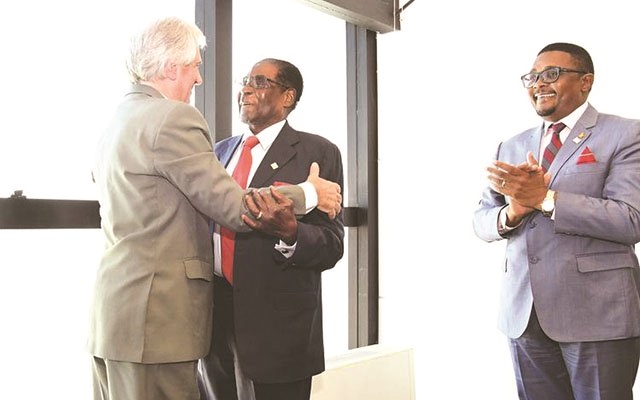
The Sunday News

 President Mugabe welcomed by Uruguay’s president Mr Tabaré Vásquez. Looking on is Foreign Affairs Minister Dr Walter Mzembi
President Mugabe welcomed by Uruguay’s president Mr Tabaré Vásquez. Looking on is Foreign Affairs Minister Dr Walter MzembiRichard Runyararo Mahomva
This article marks the end of this series which was initially grounded on capsulising the issues around the controversial appointment of President Robert Mugabe as the World Health Organisation — WHO Goodwill Ambassador.
The WHO saga was appropriated in the interest of the usual anti-Mugabe rhetoric largely by our private press and some hostile social media posts.
There was need for alternative engagement with those submissions — as should be the case in any democracy.
There is always need for public issues to be engaged from various perspectives. As such, last week’s instalment also make a fair attempt to analyse the WHO saga within the contested international system.
The article also went further to indicate that what is narrowly viewed as the denigration of the person of Mugabe broadly speaks to the attitude that the West has about Zimbabwe.
This is because President Mugabe is a Head of State, hence denigrating or disparaging his contribution to global policy-making is diplomatic ouster of the nation he presides over.
It is for this reason that what others narrowly perceive as “targeted sanctions” is the reason why we reached an outright national political-economy dilemma.
When all is said and done, with or without the legitimacy endorsement of President Mugabe by foreign institutions, our own institutions understand the undoubtable leadership credentials of the President Mugabe.
President Mugabe remains a revered ideological beacon of our nationalist aspirations which are opposed to vertical dictates of multilateral institutions.
While everyone was preoccupied with the President’s sponsored demonisation by his detractors, Lupane State University conferred him an Honourary Doctorate of Agricultural Sciences.
On that same occasion, a renowned author and poet Reverend Paul Bayethe Damasane recited a poem in honour of His Excellency’s steadfast ideological character.
A greater part of the poem gave a historical and normative allude to what has framed the iconic character of the President. Below is an extract of his rendition to Africa’s nationalist icon:
No matter what they say
No matter what they do
You remain H E – High and Excellent
Exceptional excellence
Exquisite in dress
R G – Revolutionary Guru
R G – Revolutionary giant
Like diamond pressed and squeezed under heat
You remain — heart and the head of the state
You remain R G — Resolute, stalwart, focussed, forthright and honest
The meticulous definition of a hero
The impeccable description of a revolutionary
No nonsense patriot
The unequivocating, consistent without vacillation
Unfudging
Not prevaricating
Vigilant to the cause and purpose of the building of our nation
Honest to the virtues and values of the struggle for the emancipation of
the Zimbabwean!
Undisputed Son of Bona — a bonafide son of the soil
Hero and legend of our time
A teacher by profession
Who traded the book for the bush to free us
Calabash of wisdom
All continue to drink from you.
Damasane’s poem presents an all-rounded facet of what scholars have termed “Mugabeism” summarised by Prof Sabelo Ndlovu-Gatsheni 2009:
What is termed “Mugabeism” is a summation of a constellation of political controversies, political behaviour, political ideas, utterances, rhetoric and actions that have crystallised around Mugabe’s political life.
It is a contested phenomenon with the nationalist aligned scholars understanding it as a pan-African redemptive ideology opposed to all forms of imperialism and colonialism and dedicated to a radical redistributive project predicated on redress of colonial injustices.
A neoliberal-inspired perspective sees Mugabeism as a form of racial chauvinism and authoritarianism marked by antipathy towards norms of liberal governance and disdain for human rights and democracy.
It is an ideology that is not grounded in highly celebrated conveyance of political power misnamed as transformation or independence across the continent.
The outbreak of the third-Chimurenga under the wise decolonial counsel of President Mugabe, has been punctuated by a steadfast political will to shift the means of production.
Of course, none can doubt that the Mugabe era deserves elegant appraisal for liberating the farmlands, minerals, and corporations from the historically belligerent wealth looting white minority.
Now the average Zimbabwean understands the practical meaning of independence within the context of a pro-people political economy system.
As argued in the piece we wrote and was published in the Chronicle on the 9th of February, 2017; now Mugabeism is a pan-African revolutionary philosophy, the final decolonial attack on colonialism on the continent.
With no doubt, Mugabeism now poses as an antithesis of neo-imperialism. The imperialists will not let this idea thrive. This is because Mugabeism now serves as a consortium of nativist discourses (from pan-Africanism to decoloniality of knowledge and power) seeking overall liberation of the African masses.
For that reason, it has become inevitable that Mugabeism has become a third-world template of rethinking the relationship of the centre and periphery.
It is now a modern medium of plainly articulating Fanon’s teaching of liberating violence to make disorder of the colonially set state of order.
For those of us born after 1980, Mugabeism is a thought-alternative representing a radical policy makeover as far as breaking the umbilical cord of the colony and the mother-colony is concerned.
Mugabeism: land, the person and the soil. Moreover, the responsiveness of Mugabeism to the land question is a mark of post-colonial relevance of the person and the legacy of President Mugabe.
Of course in some perspectives opposed to the idea of Mugabeism, Zimbabwe has been described as a country plunged into a political crisis, largely polarising Zimbabwe as a state run under dictatorial and corrupt terms.
-Richard Mahomva is an independent researcher and a literature aficionado interested in pan-Africanism, decoloniality and Afrocentricity. He is the Project Coordinator of Leaders for Africa Network; Convener of the Back to Pan-Africanism Conference and the annual Reading Pan-Africa Symposium. Feedback: [email protected]



